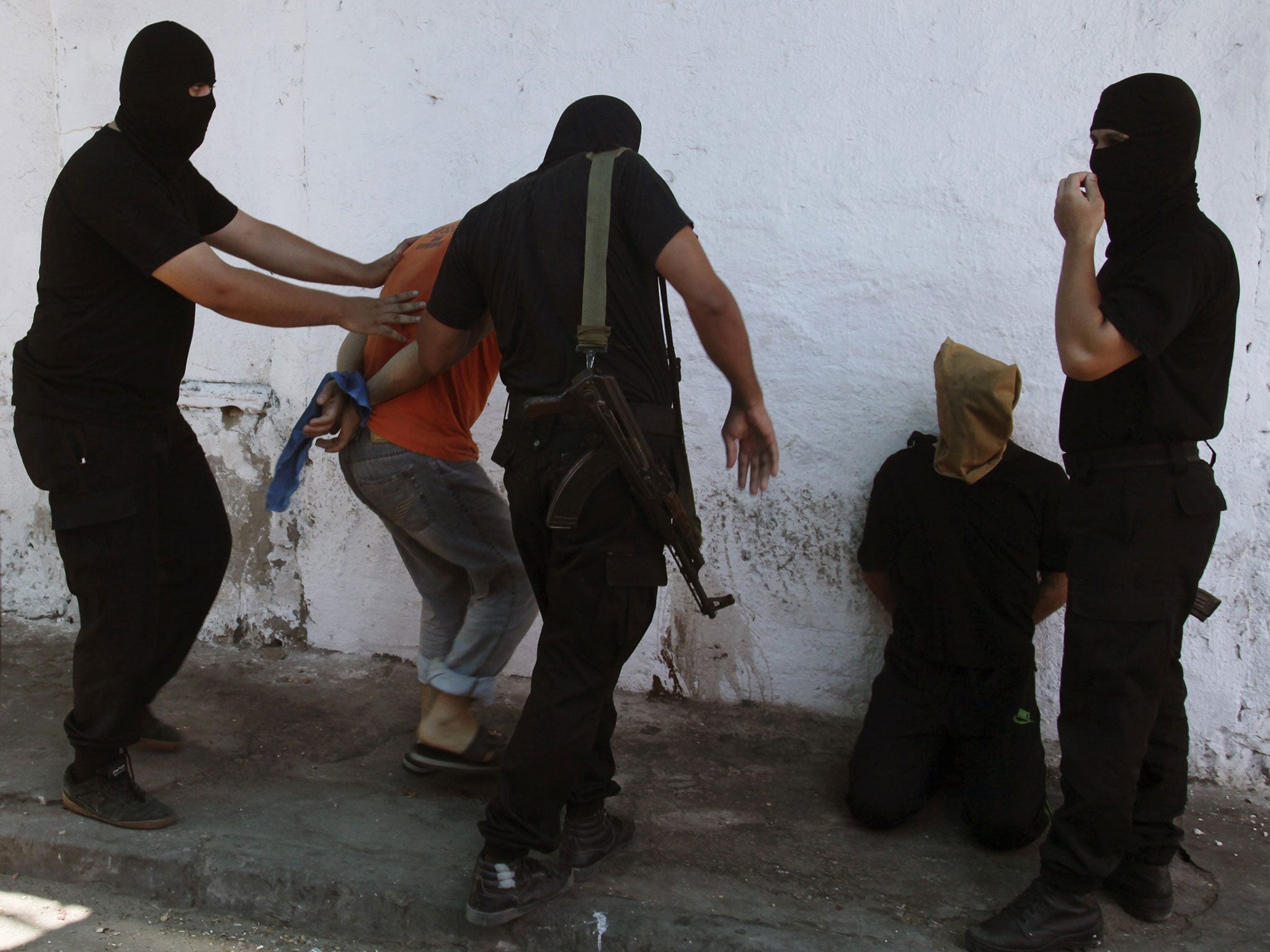Israel-Gaza crisis: Hamas says 18 suspected collaborators executed
Two of those killed in Gaza city were women

Your support helps us to tell the story
From reproductive rights to climate change to Big Tech, The Independent is on the ground when the story is developing. Whether it's investigating the financials of Elon Musk's pro-Trump PAC or producing our latest documentary, 'The A Word', which shines a light on the American women fighting for reproductive rights, we know how important it is to parse out the facts from the messaging.
At such a critical moment in US history, we need reporters on the ground. Your donation allows us to keep sending journalists to speak to both sides of the story.
The Independent is trusted by Americans across the entire political spectrum. And unlike many other quality news outlets, we choose not to lock Americans out of our reporting and analysis with paywalls. We believe quality journalism should be available to everyone, paid for by those who can afford it.
Your support makes all the difference.The Palestinian militant group Hamas has executed 18 alleged spies that it had accused of spying for Israel. Its new campaign to deter collaboration with the enemy was launched in response to Israel’s success on Thursday in targeting senior Hamas commanders.
Seven of those executed were lined up behind a mosque in Gaza City and shot in front of worshippers right after prayers, witnesses said. Human Rights Watch termed the executions a “horrendous abuse”.
Hamas’s Al-Majd website quoted a senior security official as saying that the killings marked the start of the “choke their necks” crackdown on collaborators that Palestinians blame for providing information to Israel that has enabled it to strike at members of Hamas and other militant factions since the Gaza war started on 8 July.
On Thursday, Israel dealt its most painful blow yet to the Hamas military leadership with a strike on southern Gaza that killed Mohammed Abu Shamalah, who was considered the area commander, and two other military-wing leaders, Raed Attar and Mohammed Barhoum. Earlier in the week, Israel targeted the home of Mohammed Deif, the overall commander of Hamas’s armed wing, whose location was supposed to be secret, killing his wife and two children. Mr Deif’s fate is unknown.
The executions began with the shooting of 11 alleged collaborators at an empty park in Gaza City, Palestinian sources said. Later, seven alleged spies were killed outside the Omari Mosque in Gaza City, according to witnesses. The Associated Press news agency quoted bystanders as saying that the faces of the seven had been covered before masked gunmen lined them up against a wall. A piece of paper was affixed above the head of each, with their initials and alleged crime.
One witness, Ayman Sharif, told AP that a gunman announced the seven “had sold their souls to the enemy for a cheap price’’ and had caused killing and destruction. The commander then gave the order to open fire with automatic rifles. The bodies were collected by ambulance. Hamas did not release names of those killed, ostensibly to protect the reputations of their families, but the Gaza-based Palestinian Centre for Human Rights said it had knowledge of two women among the fatalities.
All 18 executed were killed “after proof of the evidence against them and after they confessed to what they had perpetrated against the sons of the Palestinian people and its resistance,” Al-Majd said. It added that, according to their confessions, the crimes included providing information on the movements of commanders and “reporting precisely” on the locations of houses of resistance fighters, photographing houses and delineating civilian and military targets with a satellite navigation system.
The website quoted a security source as saying: “For someone who has fallen into this mud, their only salvation is to turn themselves in… The circumstances demand a strong deterrent to collaborators, and that deterrent is execution.”
The executions, the largest number of suspected informers killed in a single day since Hamas seized control of the Gaza Strip in 2007, “are a message by Hamas to the public not to do it and to collaborators not to continue”, said Talal Awkal, a Gaza-based columnist for the Al-Ayyam newspaper. Mr Awkal said the public would not question the move despite the absence of due process for the victims. “People think that they deserve it. Of course, they know it needs investigation and judgment, but maybe because of the war people ... accept that.”
Bill Van Esveld, a local representative for Human Rights Watch, said: “The summary execution of more than a dozen people is a horrendous abuse, whatever their alleged crime. Capital punishment in Gaza should be suspended until it can be formally banned, and renewed efforts are needed so that trials in Gaza respect defendants’ rights.”
Meanwhile, the death of a four-year-old Israeli boy prompted fears of a wider military offensive in the coastal enclave after the third day of fighting since the collapse of ceasefire efforts. The child was reported to have been killed in a mortar attack near a kibbutz on the southern Gaza border in the early evening. His death was the first on Israel’s side since the ceasefire ended on Tuesday.
Benjamin Netanyahu, the Israeli Prime Minister, ordered the army and the Shin Bet internal intelligence agency to intensify operations in Gaza following killing of the four-year-old.
At least 2,090 Palestinians, mostly civilians, have been killed and 10,500 wounded since the start of the fighting, Palestinian health officials say. Sixty-seven Israelis have died in the same period, all but three of them soldiers.
Join our commenting forum
Join thought-provoking conversations, follow other Independent readers and see their replies
Comments